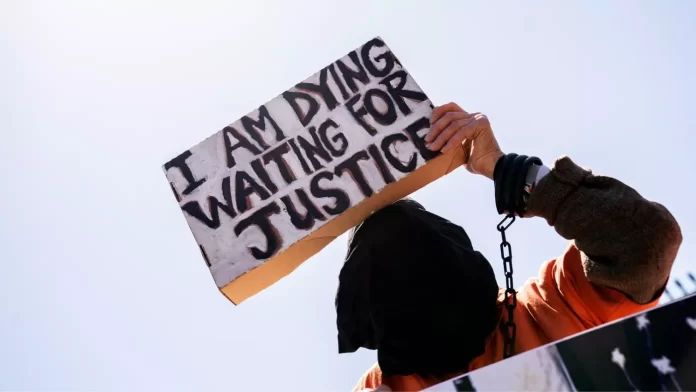Guantanamo Bay, 21 Sep: Lawyers for one of Guantanamo’s “forever prisoners” have filed a lawsuit against the two psychologists who helped conceive the CIA’s enhanced interrogation techniques, which have been widely seen and condemned as torture, reported Middle East Eye yesterday.
In a federal court in the US state of Washington, lawyers representing Abu Zubaydah, whose given name is Zayn al-Abidin Muhammad Husayn, filed the lawsuit against James Mitchell and Bruce Jessen, who were recruited by the CIA in 2002 to design and help conduct interrogations on suspects captured in Afghanistan and elsewhere.
“In proposing the program to the US government, Mitchell and Jessen misled officials regarding the scope and severity of the tactics that they would ultimately use on Abu Zubaydah,” reads the lawsuit, which was filed on Monday.
“In practice, Mitchell and Jessen used torture and cruel and inhuman treatment to force Abu Zubaydah and other subjects into a state of “learned helplessness”.
The lawyers for Abu Zubaydah added that the torture of the Guantanamo detainee did not lead to valuable intelligence, but the two psychologists “were no longer actually seeking information”.
“Rather, they were using Abu Zubaydah as a guinea pig for untested interrogation methods, laying the groundwork for what provided them a hugely lucrative contracting business to provide detention and interrogation personnel to the CIA and the US Defense Department,” the lawsuit said.
According to a Senate intelligence report, the two contractors were paid $81m by the US government.
Abu Zubaydah, a Saudi-born Palestinian man, was captured nearly two decades ago and held, according to his lawyers, at numerous CIA “black sites” overseas.
According to a Senate intelligence report, Abu Zubaydah was interrogated using techniques that amounted to torture, including being waterboarded 83 times in one month, hung naked from a ceiling, and deprived of sleep for 11 straight days.
Another technique that was approved by the CIA, recently revealed after the declassification of documents in 2022, was called “walling”. It involved placing the detainee’s heels against a plywood wall “which had flexibility to it”, and a rolled-up towel was put around the person’s neck.
“The interrogators would then grab the ends of the towel in front of and below the detainee’s face and shove [the detainee] backwards into the wall, never letting go of the towel,” the report said. One of the interrogators said the goal was to “bounce” the detainee off the wall.
In 2006, Abu Zubaydah was transferred to the Guantanamo Bay military prison, where he is being held to this day without charge.
The court on Tuesday issued a summons to Mitchell and Jessen.
This is not the first lawsuit brought against Mitchell and Jessen by Guantanamo detainees. In 2017, the two settled a lawsuit against them that was filed on behalf of former detainees Suleiman Abdullah Salim, Mohamed Ahmed Ben Soud, and the family of Gul Rahman, who died in a CIA “black prison” in 2002 during days of interrogation.
In a previous deposition, Jessen said that the two men had reservations about continuing the enhanced interrogation programme.
“Jim and I didn’t want to continue doing what we were doing,” Jessen said. “We tried to get out several times and they needed us, and we – we kept going.”
In his deposition, Mitchell rejected that waterboarding was painful, and also said that the techniques used on detainees wouldn’t cause long-term trauma.
“It sucks, you know. I don’t know that it’s painful,” he said. “I’m using the word distressing.”
Abu Zubaydah previously tried to subpoena Mitchell and Jessen in connection with a Polish criminal investigation over his torture at a CIA black site in Poland. However, after the issue was brought to US courts, the Supreme Court in 2022 blocked the move, in a ruling that declared the location of a CIA black site was a state secret.
Abu Zubaydah’s lawyers say the torture enacted on the detainee by Mitchell and Jessen led to him having seizures, brain damage and memory loss – among other health issues.
“The latter is particularly painful for him, given that he has been held nearly incommunicado for over two decades, and still cannot see or speak with his family; it grieves him that he is rapidly forgetting the faces of his loved ones,” the lawsuit says.




